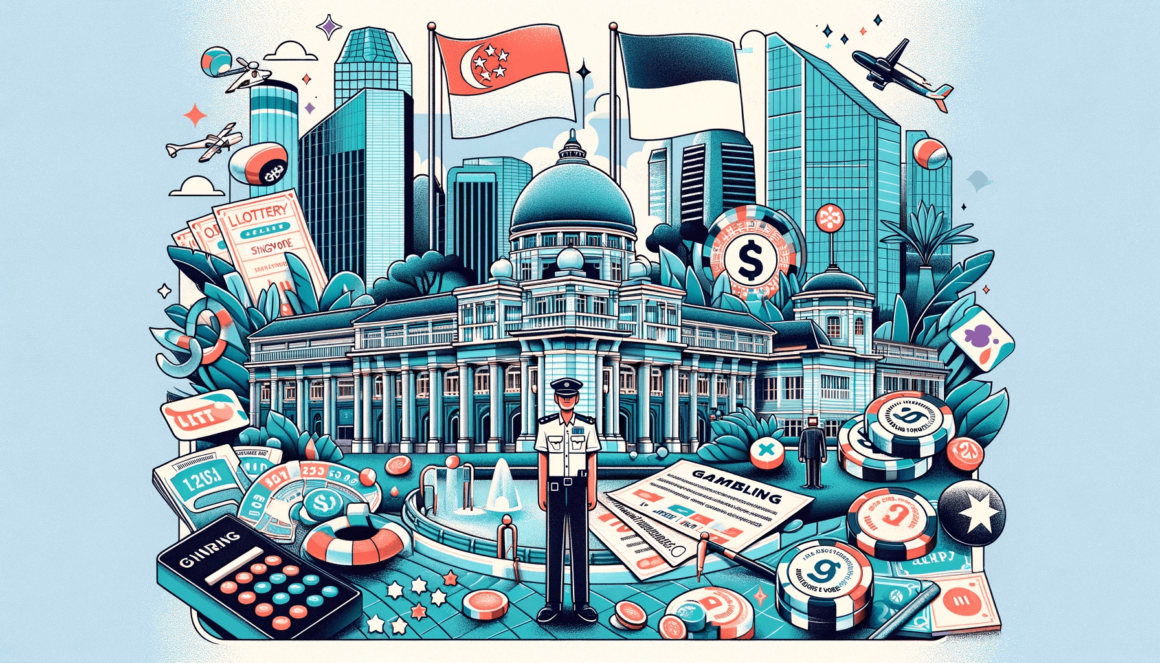All You Need To Know About Gambling in Singapore Statistics in 2024
Singapore’s gambling industry is not as lavish as Vegas’, but it is still one for the books. The glamour and richness of gambling in the Lion City are seen even through its few prosperous casino resorts.
Its casino industry makes up 4% of the Asia-Pacific market size, accounting for 1.5% of the global market size. Overall, this makes Singapore the 3rd biggest casino market in the world.
As you’ll find in this article, Singapore’s gambling scene is worth exploring.
Highlights of the Article
- Online gamblers in Singapore are decreasing, from 1% of Singapore residents in 2017 to 0.3% in 2020.
- A 2020 survey showed that 34% of Singaporeans played 4D.
- The most drawn combination in Singapore’s 4D history is “5807,” which has been drawn 27 times since 1986.
- Around 16% of Singaporeans gambled socially in 2020.
- Singapore’s 2021 horse race betting industry received $818 million in wagers.
- The overall probable pathological and problem gambling rate in Singapore is 1.2%.
- There were 178,000 self-exclusions received by casinos in Singapore in 2020.
- Singapore’s casino market growth rate decreased from 2017 to 2021 by a negative 19%.
How Much Do Singaporeans Lose When Gambling?

Singapore’s National Council on Problem Gambling revealed Singaporeans lost around $725 to gambling in 2017. That was the 3rd highest gambling average loss globally.
Singapore’s Ministry of Home Affairs strictly regulates gambling. It maintains law and order in the country’s gambling scene to minimize potential harm to society.
From 2019 to 2022, authorities arrested over 2,400 people in Singapore for illegal gambling. They bet through prohibited online platforms or unlicensed bookies. With illegal gambling, Singapore’s loss is more significant than the figures reported.
You can find other essential and shocking gambling statistics in Singapore below.
Singaporean Online Gambling Statistics
During the pandemic, Singapore saw a gradual decrease in physical gambling. The government implemented restrictions nationwide. To continue gambling, some Singaporeans switched to placing their wagers online.
However, online gambling is still not significant in Singapore. Below are statistics that will tell you all about Singapore’s online gambling industry:
1. Only 0.3% of Singaporeans gambled online in 2020.
(National Council on Problem Gambling)
In 2017, 1% of Singaporeans gambled online. That means online gamblers in the country are decreasing.
Some gamblers moved to online betting during the pandemic, but most bettors who have been gambling online stopped. With that, the industry did not grow.
Singapore’s tight regulation in the gambling industry holds back the sector. Plus, there are limited choices regarding betting online. The monopoly Singapore Pools operates online lotteries and shares sports betting with The Singapore Turf.
2. According to a 2018 study, 12% of participants only gambled online in Singapore.
(PubMed)
Only 12 out of 100 participants in the study admitted to only gambling online. The remaining participants (82%) both gambled online and offline.
This shows that the offline gambling market in Singapore is more prosperous than its online counterpart.
3. A study showed the median of the largest debt due to online gambling was $20,000.
(PubMed)
The study is about treatment-seeking patients in Singapore. It also revealed the median biggest debt due to offline gambling, only $500.
Debt from gambling is the money owed from a gambling activity. The debtor might owe any of the following:
- A person
- Specific gambling provider
- Creditors that fund gambling
Although the number of gamblers who bet online is low, gambling involvement over the Internet is constant. Bettors regularly wager online and at a higher bid, contributing to higher debts online.
Offline Gambling Statistics in Singapore
Singapore’s offline gambling industry is strict. Land-based gambling is prohibited by the Gambling Control Act (GCA) unless the establishment has a license. Singapore’s government currently licenses 2 land-based casinos.
The only gambling operator that offers non-casino gambling services is Singapore Pools. Any bets made beyond those licensed establishments and services are illegal in Singapore.
Learn more about Singapore’s offline gambling industry through the following stats and facts.
4. Based on a 2020 survey, 34% of gamblers in Singapore played 4D.
(National Council on Problem Gambling, Singapore Pools)
4D is the most popular type of gambling in Singapore. It is a lottery-type game that stands for “4 Digits,” where a gambler bets on 4 numbers.
Singaporeans are into 4D because it is a cheap and easy way to gamble. The minimum bet for an ordinary entry is $1.
The game also has a variation called “4D Roll.” The gambler picks the first 3 digits. Then, the 4th digit is a “rolling digit,” which is a range of numbers (ex., 0 to 9). This gives the ticket 10 possible outcomes instead of 1. The minimum bet for this is $10.
5. The combination “5807” in 4D gambling has been drawn 27 times since May 1986.
(Singapore Pools)
The “5807” combination is the most frequently drawn number since the first 4D draw in May 1986. Here are the top 5 combinations in Singapore’s 4D history:
| Order | 4D combination | Number of times drawn |
| 1 | 5807 | 27 |
| 2 | 6741 | 26 |
| 3 | 9395 | 26 |
| 4 | 4785 | 25 |
| 5 | 9509 | 25 |
This may or may not mean that betting on these numbers creates higher chances of winning the game.
6. 31% of gamblers in Singapore played Toto in 2020.
(National Council on Problem Gambling, Singapore Pools)
TOTO is the second most popular method of gambling in Singapore. It is the first lottery in Singapore Pool’s history. It was introduced in 1968, where gamblers must pick a combination of 6 numbers per ticket.
It is popular because one can win by having 3 to all 6 numbers drawn from the winning draw. The odds of winning in TOTO is 1 in 54, but winning the jackpot (all 6 digits) is 1 in 14 million.
7. Based on NCPG’s 2020 survey, 17% of Singaporeans participated in the Singapore Sweep.
(National Council on Problem Gambling, Singapore Pools)
Singapore Sweep is a type of lottery where gamblers do not pick the ticket number combinations. Regardless, Singaporeans bet on it for as low as $3.
There is a 9.1% chance of winning in the Singapore Sweep. Multiple tickets can be the winning one, so the prize depends on how many winning tickets there are.
If there is only one ticket surrendered, that person hits the jackpot. They will win $2.3 million. The odds of this happening is 1 in 3.5 million.
8. In 2020, 16% of Singaporeans gambled socially.
(National Council on Problem Gambling, Channel News Asia)
Gambling among family and friends within a home property is called social gambling. It is not illegal to gamble socially in Singapore, but the laws were not clearly defined before.
The Singapore government cleared things up in 2022 by officially legalizing social gambling. It is under the new Gambling Control Act (GCA).
The law allows social gambling as long as it occurs in an individual’s home. When it does, the gambling activities must not be for business or private gain.
Sports Betting in Singapore Statistics
In 1968, sports betting became legal in Singapore. It was the same time Singapore Pools was created, the country’s leading sports betting venue and provider.
The most popular sport for betting in Singapore is football. It is followed by motor racing or Formula 1.
More vital statistics and information about Singapore’s sports betting industry are below:
9. Singapore’s horse race betting industry received $818 in bets in 2021.
(The Straits Times)
The Singapore Turf Club is one of the legal betting venues for horse race betting in Singapore. The bets were low in 2020 because the venue was closed during the circuit breaker. However, it bounced back in 2021, with a 65% increase in wagers.
10. Singaporeans spent $9.2 billion betting on soccer and playing lotteries in 2022.
(TNP)
The Tote Board handles the revenue from Singapore Pools and Singapore Turf Club. They only reported the total revenue in 2021, not including its breakdown. They revealed that the industry earned $6.6 billion in lotteries and sports betting.
The Tote Board did the same thing in 2022, only reporting a $9.2 million total revenue. They imposed that revenue from soccer betting is part of the industry’s huge earnings.
Singaporean Gambling Addiction Statistics
Gamblers in Singapore are decreasing. According to a 2017 survey by NCPG, 52% of Singaporeans gambled at least once within the year. That fell in 2020 when only 44% of Singapore residents over 18 participated in some form of gambling activity within the year.
Since fewer Singaporeans are gambling, the number of problem gamblers remains low. Learn more about it below:
11. The probable pathological gambling rate among Singapore residents was 0.2% only in 2020.
(National Council on Problem Gambling, National Academies Press)
Gambling can turn into a mental disorder called pathological gambling. The person with the disorder experiences the following:
- Irrational thinking
- Loss of control over gambling
- Getting preoccupied with gambling (and the thought of it)
- Constantly thinking of where to acquire money for gambling
- Continuation of adverse gambling behavior despite experiencing consequences
Due to reduced gambling activities, Singapore only sees a small percentage of pathological gamblers.
12. The probable problem gambling rate in Singapore was 1% in 2020.
(National Council on Problem Gambling)
Problem gambling describes any gambling behavior that causes harmful consequences to the gambler. These consequences can also affect the gambler’s relationship with family and friendships. When it does, it is called ‘second-hand’ harm.
Remember that all pathological gamblers are problem gamblers, but not all problem gamblers are pathological gamblers.
According to the previous statistic, Singapore’s probable pathological and problem gambling rates are 1.2 per cent.
13. Casinos in Singapore received 178,000 self-exclusions in 2020.
(Statista, National Council on Problem Gambling)
Singapore’s number of self-exclusions decreased in 2020. This is due to the pandemic, where the country saw fewer tourist gamblers applying for self-exclusions.
When people realize their gambling habits harm them, they can apply for a self-exclusion.
The country’s National Council on Problem Gambling oversees cases of self-exclusion.
Once a Singapore resident seeks self-exclusion, it will immediately take effect. The person who applied for self-exclusion will be banned from the following:
- Private clubs
- Casino premises
- Jackpot machine rooms
- Access to Singapore Pools
- Taking part in any casino games
These bans will remain in effect until the council revokes the resident’s self-exclusion.
Growth and Trends of Singaporean Gambling
Singapore updated its laws in gambling to keep up and remain strict with emerging gambling trends. The Gambling Control Act of 2022 and the Gambling Regulatory took effect on August 1, 2022.
Before Singapore passed these laws, betting only referred to horse races and sports betting. Now, the regulations cover a more advanced and neutral definition of gambling. Here are the types of betting that the law considers gambling:
- Competition
- Sporting event
- The outcome of a race
The following are numbers that will tell you more about the trends and growth in Singaporean Gambling:
14. There have been at least 1,000 people arrested in Singapore for unlawful gambling since 2010.
(Straits Times)
Unlawful gambling activities have been stable in Singapore for decades, meaning the country successfully controls these issues. They could improve by working on decreasing this number instead of keeping it steady.
15. Singapore’s casino market’s growth rate was negative 19% from 2017 to 2021.
(Global Data)
The market experienced the most decrease during the peak of the pandemic. It is because the lockdown restrictions forced casinos and betting venues to close.
Moreover, people were more cautious with their spending during the pandemic. People grappled with uncertainty when COVID-19 emerged, which pushed them to reduce their spending on non-essential products and services.
16. Singapore recorded a 50% de-growth in its casino sector in 2021.
(Global Data)
Before the pandemic, Singapore’s casino sector was the overall 2nd highest market globally. When the country’s casino gambling market dived down, it lost its standing to France.
Singapore’s casino industry started reverting in 2020 when its market experienced a 6% de-growth. A year after, the industry boomed again and grew by 50%, which accounts for an additional $2 billion to the industry.
Final thoughts
Singapore is an economic powerhouse, but not in terms of its gambling industry. The country is recognized as politically stable, with low corruption rates. That is why they regulate their gambling industry well and only see a low rate of problem gamblers for decades.
Some see this insignificance as room to grow, but the Singapore government is keen to keep things as they are. The only change happening is the government creating laws for its citizens’ convenience and protection against the harm and consequences of gambling.
FAQ
Is gambling a big problem in Asia?
Gambling prevalence is high in Asia because it is a common social activity in most Asian countries. Some relate gambling to several beliefs. This makes Asians more likely to develop a gambling problem or disorder.
How much is gambling winning tax in Singapore?
Singaporean residents do not need to declare gambling winnings in income tax returns. The IRAS mentioned that winnings from gambling are not considered income, therefore, not taxable.
Who cannot enter a Singaporean casino?
Anyone below 21 years old is not allowed inside a Singaporean casino. A person with an approved and effective self-exclusion by the NCPBG cannot enter a casino in Singapore.
 BC.Game
BC.Game  BitStarz
BitStarz  Ducky Luck
Ducky Luck  Red Dog Casino
Red Dog Casino